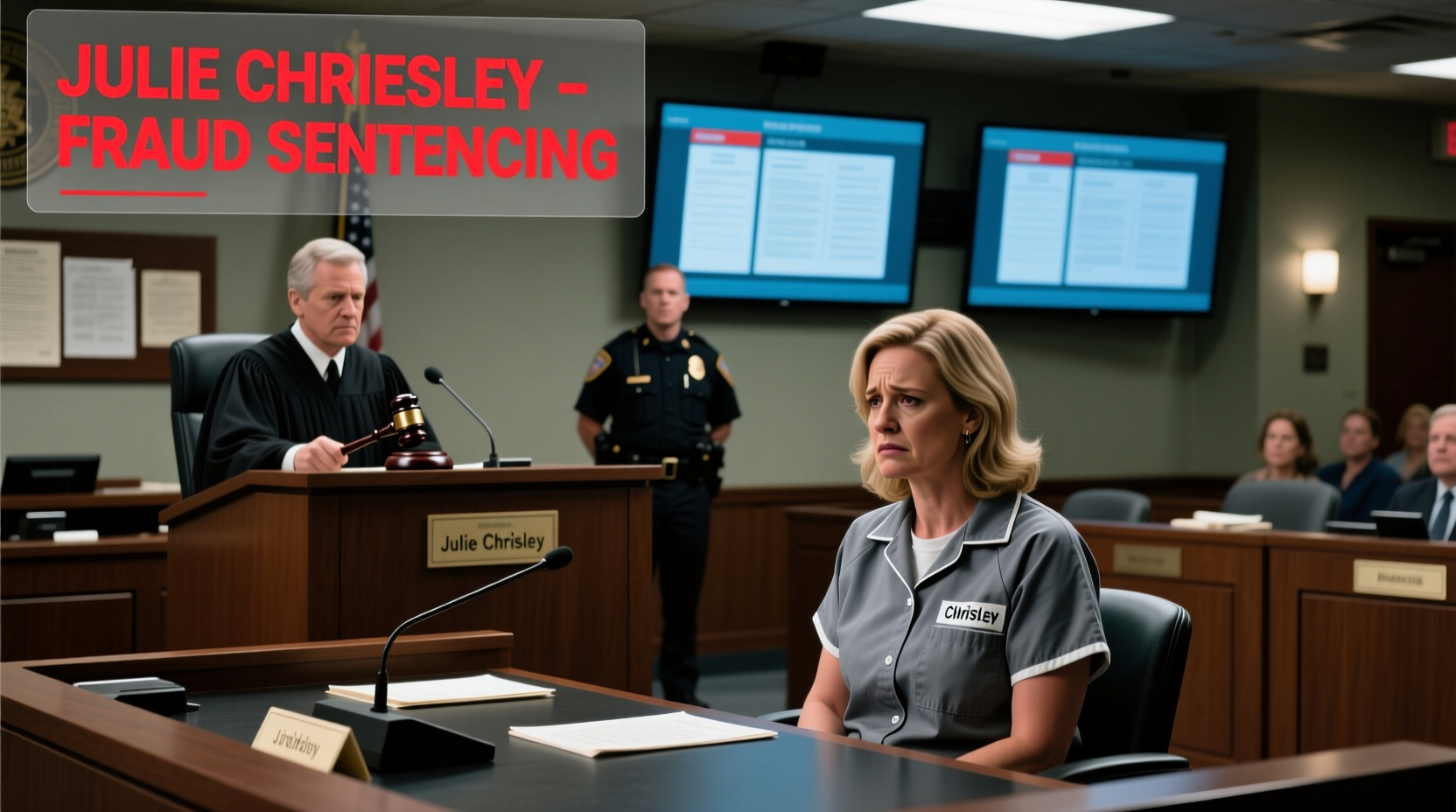Julie Chrisley, best known for her role on the popular reality TV series *Chrisley Knows Best*, is currently serving a federal prison sentence due to her involvement in a multi-year bank fraud scheme. Once celebrated for her sharp wit and matriarchal presence on screen, Julie’s public image took a dramatic turn when she was convicted alongside her husband, Todd Chrisley, on charges related to financial crimes. This article provides a comprehensive explanation of the fraud case, the evidence that led to her sentencing, and the broader implications of her conviction.
The Fraud Scheme: How It Began

The Chrisley fraud case centers around a decade-long conspiracy to defraud banks and obtain government benefits through false pretenses. Between 2006 and 2017, Julie and Todd Chrisley orchestrated a complex financial deception involving loan applications, identity theft, and falsified documents. The couple applied for over $25 million in loans from multiple financial institutions, often inflating their income and assets to qualify.
They also fraudulently obtained more than $3.5 million in COVID-19 relief funds during the pandemic, including Paycheck Protection Program (PPP) loans and Economic Injury Disaster Loans (EIDL), despite not qualifying. These funds were allegedly used for personal expenses, including luxury vacations, home renovations, and private school tuition.
Federal investigators uncovered that the Chrisleys submitted forged tax returns, fake payroll records, and misleading financial statements to lenders. Julie played an active role by signing loan documents, managing accounts, and communicating with banks—actions that prosecutors argued demonstrated her full awareness and participation in the scheme.
Criminal Charges and Trial Outcome
In December 2022, a federal jury in Atlanta found both Julie and Todd Chrisley guilty on multiple counts, including:
- Conspiracy to commit bank fraud
- Bank fraud
- Wire fraud
- Conspiracy to make false statements to a financial institution
- Tax evasion
- Aggravated identity theft
Julie was specifically convicted on nine counts, while Todd faced additional charges due to his central role in orchestrating the fraud. Prosecutors emphasized that Julie was not a passive participant; emails, bank records, and testimony from co-conspirators revealed her consistent involvement in financial decisions and deceptive practices.
During the trial, the defense argued that Todd controlled the finances and that Julie relied on him for guidance. However, the jury concluded that she knowingly engaged in illegal activities, particularly given her background in business and previous experience managing family enterprises.
Sentencing: Why Julie Received Six Years
In June 2023, U.S. District Judge Eleanor L. Ross sentenced Julie Chrisley to six years in federal prison, followed by five years of supervised release. She was also ordered to pay $200,000 in restitution. The sentence reflected both the severity of the crimes and her level of culpability.
Judge Ross noted that while Julie was not the primary architect of the fraud, she was “a willing and knowing participant” who benefited directly from the illicit gains. The court highlighted her use of fraudulent loan proceeds to maintain a lavish lifestyle, including designer clothing, luxury vehicles, and high-end real estate.
“Fraud undermines the integrity of our financial system. When individuals exploit trust and deceive institutions for personal gain, they must face meaningful consequences.” — Judge Eleanor L. Ross, U.S. District Court
Key Factors in Sentencing
| Factor | Explanation |
|---|---|
| Duration of Fraud | The scheme spanned over 11 years, indicating a sustained criminal effort. |
| Amount of Loss | Total losses exceeded $27 million, affecting multiple financial institutions. |
| Use of Stolen Identity | A former employee’s identity was used to secure loans without consent. |
| Lack of Remorse | No admission of guilt or restitution prior to trial weakened mitigation arguments. |
| Public Influence | As a public figure, the court emphasized the need for accountability. |
Timeline of Legal Events
Understanding the sequence of events helps clarify how the case unfolded:
- 2006–2017: Julie and Todd Chrisley submit fraudulent loan applications to multiple banks.
- 2020–2021: The couple applies for and receives millions in pandemic relief funds under false pretenses.
- November 2022: Federal indictment unsealed, charging both with 12 counts of fraud and tax evasion.
- December 2022: Jury returns guilty verdict after a four-week trial.
- June 2023: Julie sentenced to 72 months in prison; Todd receives 12 years.
- September 2023: Julie reports to federal prison in Aliceville, Alabama.
- 2024–2025: Appeals process ongoing; earliest possible release date estimated in 2027 with good behavior.
Mini Case Study: The Role of Reality Fame in Legal Scrutiny
Julie Chrisley’s case illustrates how public visibility can intensify legal scrutiny. While many white-collar criminals operate in obscurity, the Chrisleys’ televised lifestyle attracted attention from both fans and regulators. Their show, which aired on USA Network and later Peacock, frequently showcased expensive homes, cars, and vacations—lifestyle markers that raised red flags once financial irregularities emerged.
Investigators reportedly used footage from *Chrisley Knows Best* as part of their evidence, noting discrepancies between the family’s on-screen wealth and their reported income. For example, episodes showing luxury trips coincided with periods when no legitimate income was declared. This intersection of entertainment and finance created a unique evidentiary trail that prosecutors leveraged effectively.
This case serves as a cautionary tale: publicly flaunting wealth without transparent financial backing can invite investigation, especially when combined with suspicious banking activity.
Common Misconceptions About Julie’s Involvement
Since the verdict, several myths have circulated about Julie’s role in the fraud. Clarifying these is essential for accurate understanding:
- Misconception: Julie was unaware of the fraud.
Reality: Court records show she signed loan documents, corresponded with lenders, and managed accounts tied to the fraudulent activity. - Misconception: She only went to jail because of her husband.
Reality: Julie was convicted on independent charges based on her actions, not marital association. - Misconception: The prison sentence was excessive.
Reality: Federal sentencing guidelines for multi-count bank fraud typically result in multi-year terms, especially with large financial losses.
FAQ
Is Julie Chrisley still in prison?
Yes, as of 2024, Julie Chrisley remains incarcerated at FCI Aliceville in Alabama. Her projected release date, accounting for good behavior, is in 2027.
Did Julie appeal her conviction?
Yes, both Julie and Todd Chrisley filed appeals challenging the verdict and sentencing. As of mid-2024, the appeals are pending in the 11th Circuit Court of Appeals.
Could Julie have avoided prison with an earlier plea deal?
Potentially. Had she cooperated with prosecutors or admitted guilt before trial, a reduced sentence might have been possible. However, the decision to go to trial eliminated that opportunity.
Conclusion: Accountability Beyond the Spotlight
Julie Chrisley’s imprisonment underscores a fundamental principle: fame does not exempt individuals from legal accountability. Her conviction was not based on speculation but on documented financial misconduct, signed agreements, and a pattern of deceit that persisted for over a decade. While her story began as a reality TV narrative of Southern charm and family dynamics, it evolved into a stark reminder of the consequences of financial fraud.
The case also highlights the importance of transparency, especially for public figures whose lifestyles are on display. Whether you’re managing personal finances or running a business, ethical conduct and truthful reporting are non-negotiable.









 浙公网安备
33010002000092号
浙公网安备
33010002000092号 浙B2-20120091-4
浙B2-20120091-4
Comments
No comments yet. Why don't you start the discussion?